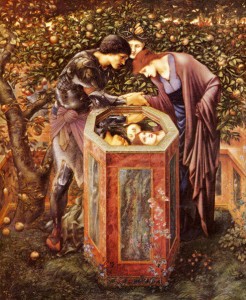 Metaphysics is a theory of being in itself, of the essence of things, of the fundamental principles of existence and reality.
Metaphysics is a theory of being in itself, of the essence of things, of the fundamental principles of existence and reality.
A major part of Metaphysics is concerned with the Static Part of the Reality, Being (Ontos, Ontology). The main issues of Metaphysics can be simply derived by playing with the verb to-be.
Behind Ontology (Being) is the verb to Be. The noun Being is-a-State-of to Be. When we take the first-derative, the difference of Being, Being becomes Becoming.
When you apply Causal Reasoning you have to find out Who is the Cause of the change of Being to Becoming. You also have to find out how a Static System changes into a Dynamic System.
A solution is to Imagine an Ultimate Being (The Absolute) who changed his Being into Becoming. This Absolute Being is the One. The change from the Static to the Dynamic is called Creation.
There are two possibilities. The Creator is Outside the Becoming or the Being is part of the Becoming. In the first case we are talking about an Ultimate Being, God, the Void, who is the creator of the Dynamic System. In the second case God IS the Dynamic System. Let’s call this Being “All That Is“.
The Difference between God and “All That Is” is the way the Act of Creation takes place. The Act of Creation of God is an Explosion, a Unique Act. The Act of Creation of “All That is” is an enfolding. Creation as an Enfolding moves slowly. Every new Expressions of the Unfolding show itself at the Right Time and the Right Moment.
The distinction between Being and Becoming has resulted in a major Fight on every Scientific Battleground we can imagine.
Let’s have a short look at Information Technology.
Data-oriented methodologies emphasize the representation of the Static relationships between the parts of the whole, the Data or the Database. On the other hand, process-oriented methodologies emphasize the actions Performed By a software artifact, a Program.
When we dig a little deeper into this subject we see that A Program (something written in a Programming Language) is a Static (Stored) Representation of a Process. When the Computer Executes a Program it Becomes a Process.
So the Dynamic is Stored in the Static and the Static becomes Dynamic because something called a Computer (An Actor, the Operating System) activates the Static. Interesting Enough the Computer is also a Program that is stored in itself. The basic part of the Computer is the Clock. The Clock generates a Rhythm.
So the Static is really a Dynamic and the Essence (The Metaphysics) of the Computer is a Clock, A Rhythm.
The Dynamic Structure of the Computer is an Enfolding of the Basic Structure of the Computer Itself which is Stored in Itself, which is a Rhythm. During the Rhythm the Computer moves through a Cycle.
I don’t want to dig deeper but I hope you see that the Computer Metaphor is a representation of the idea of “All What Is”.
The interesting point is that in the Reality of the Computer Metaphor there are Many Beings (Monads).
If we dig a little deeper we see that the Many Beings Communicate (by the Internet Protocol). They Unite on a deeper Level and transform into a Network. The Network is What it Is.
To a Human Observer the Network makes no Sense. We are unable to understand the essence (The Metaphysics) of the Network. We understand our Part but don’t see the Whole.
The Whole, the One, is beyond our Understanding. It is Unknowable (“neti neti“, “not this, not that“).
Language is a Static Representation of the Dynamics of Speech. A Human executes Language to perform the Process of Speech but Speech is not captured by Language. Human Speech is constantly adapting to Practice and Language is adapting to Practice. New (Computer) Languages are created all the time.
A Computer Language is a sub-set of Human Languages called Logic. Logic is a sub-set of Human Speech called Reasoning but Reasoning is not able to Understand the Whole.
Theory is a Static Representation of the Dynamics of Practice. A Human executes a Theory to perform the Process of Practicing. But Practice is not able to Understand the Whole so When a Practice fails we create a new Theory. Theory is adapted Practice and Practice is applied Theory. Being is adapted Becoming.
Being changes in Time because we are Experiencing (Being (t) = Being (t-1) + Experience). Experience is the Difference of Being is Becoming. The Becoming who is The One is generating Experience.
God is the Experience of God.
 As You see it is possible to create many concepts and theories of Metaphysics just by Playing with the Verb To Be.
As You see it is possible to create many concepts and theories of Metaphysics just by Playing with the Verb To Be.
There is one more Language Game to Play. If we Play this Game we are entering the World of Deleuze.
Deleuze was fascinated by the Mathematician and Philosopher Leibniz. Leibniz invented a new Mathematical Game called Differentials. When you calculate a differential you calculate the way a function is changing in time.
Leibniz found a way to move from being to becoming and his formula is very easy. Becoming = Lim (t -> 0) (Being (t+1)-Being (t)). Find the smallest distance between two moments of Being. The smallest distance between two Beings is an Event.
The basis Structure of our Reality is not a Substance (The Static) but something that Moves Us (Emotion). The basic Structure of our Universe are Moments, Nows.
We are Points of View that are Experiencing a Beautifull Fluent Crystal, a HyperDiamond. Every Point of the Multi Dimensional Diamond is an Event.
We are trying to explain the Beauty of this Crystal to the other Points of View but we are unable to do this because we are only able to see a very small part and we are looking from our own angle.
We will never See the Whole until we are able to become a Circular Point of View, A Communion.
LINKS
About Events, Time, Being and Becoming in Physics
About Leibniz and Differentials
The Relationship between Events and Free Will
Why the Universe is a Configuration of Nows
About Spinoza, The Philosopher of the Emotion
About the Relationship between Events and Creativity, the Ontology of Deleuze
